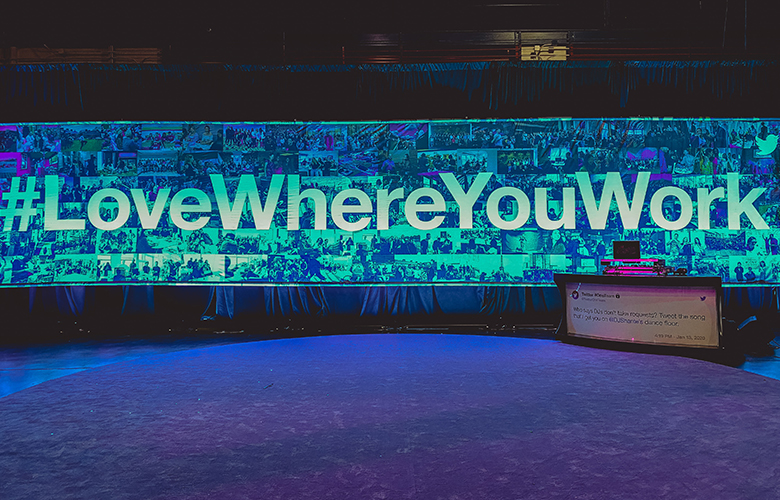
Ya’ll, let’s look at the 2019 Stage Manager Survey today.
“The what?” you might say.
Every couple of years, David J. McGraw and whatever university he’s working at (I believe it’s currently Elon), conduct a fairly extensive survey of stage managers polling everything from education level, frequency of wearing show blacks, types of training, how much garbage do you eat, and theft in the workplace to some of our favorite questions on this blog like:
You can check out several years of archived surveys here.
You can also find the entire 2019 Stage Manager Survey here.
So let’s dive into some of these juicy statistics, starting with my favorite. How much are stage managers making right now?
Ok, ok, right now we all know it’s zip thanks to old ‘Rona. But… how much are they making when the world isn’t upside down?
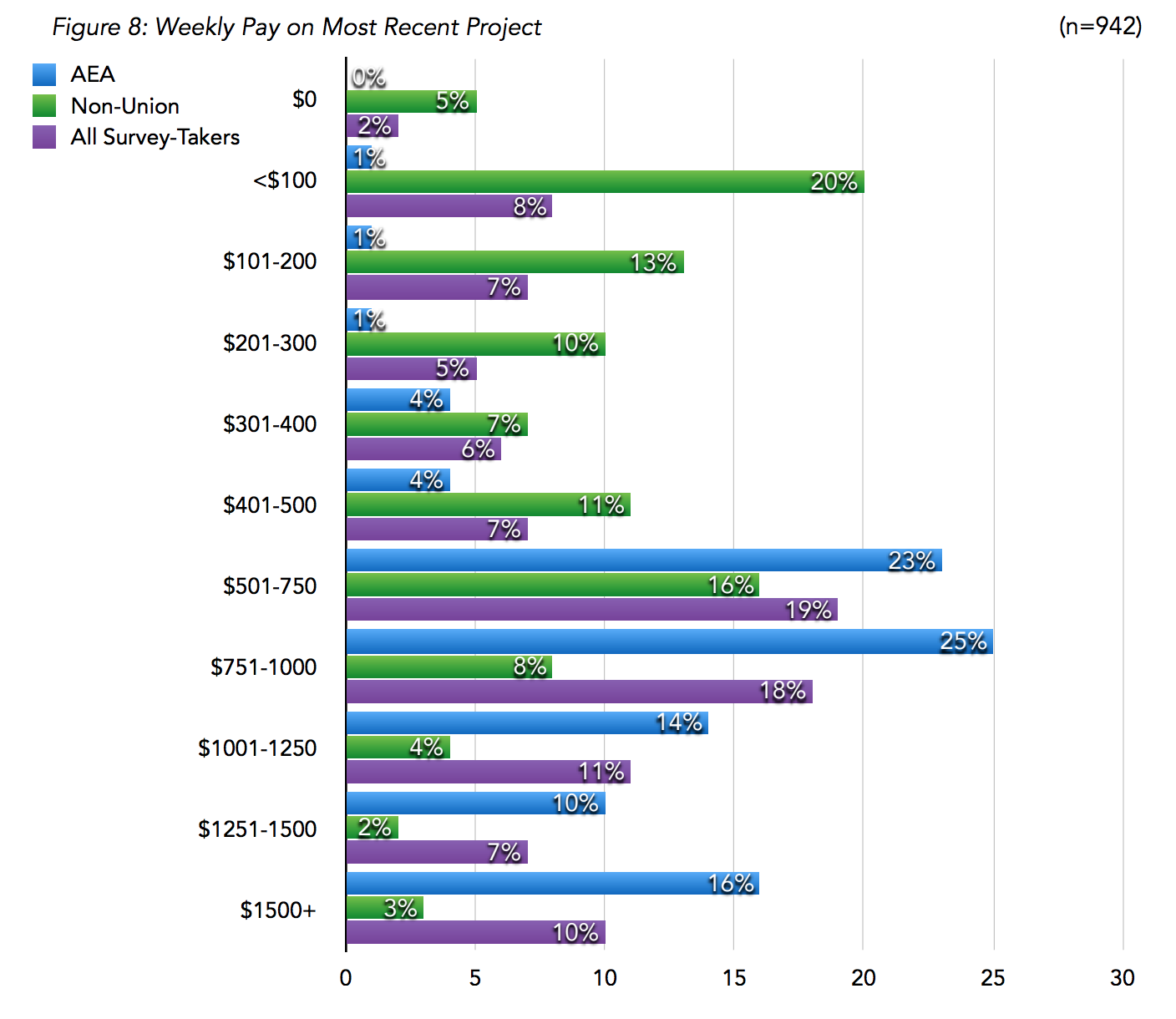
You can see from the chart above that of 942 responses, the highest overall percentage of survey takers (19%) are making between $501-750 a week.
The largest percentage of non-union stage managers (20%) are making less than $100 a week. As a non-union stage manager, I wonder a little about this statistic, because those feel like volunteer wages and I wonder if it is entirely people who consider themselves “professional” (yes, even without union affiliation) answering that, or if it’s people who dabble and do community theater answer that question.
Or perhaps that is an accurate snapshot for many non-union stage managers. I have genuinely never made that little as one, so I am a little confused. It’s like intern wages, if that.
On the flip side, things are looking promising for AEA stage managers, coming in with their highest percentage of stage managers (25%) making $751-1000 a week.
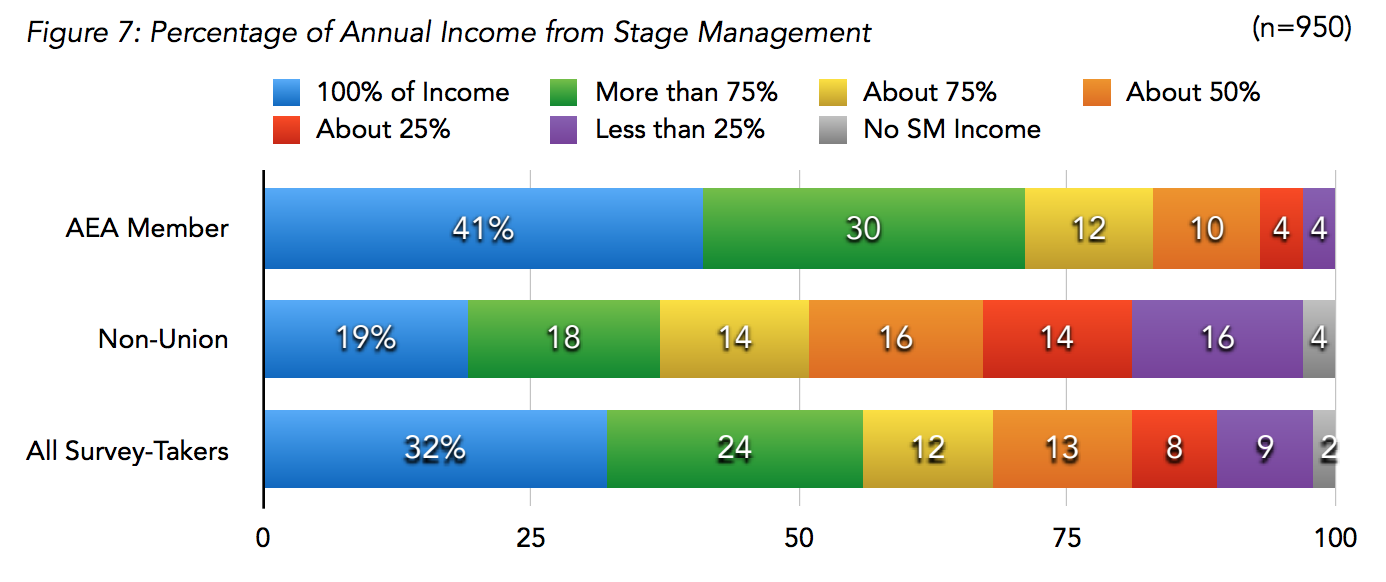
This chart shows you the percentage of income the stage managers taking the survey report as stage management income.
As a side note from the survey, members of AGMA (48%) represented the strongest showing for making their full income from stage managing.
Now let’s look at my favorite bar graph every year, the one that makes my blood boil. The one that makes me feel like my head’s generally exploding. And the one that makes me feel a very strong, personal “F%C! YOU” against the patriarchy. Even as I was one of the 12% who checked the over $1500 in November.
This is how much stage managers make per week, broken down by gender.
Note what 30% of the men make versus 12% of the women.
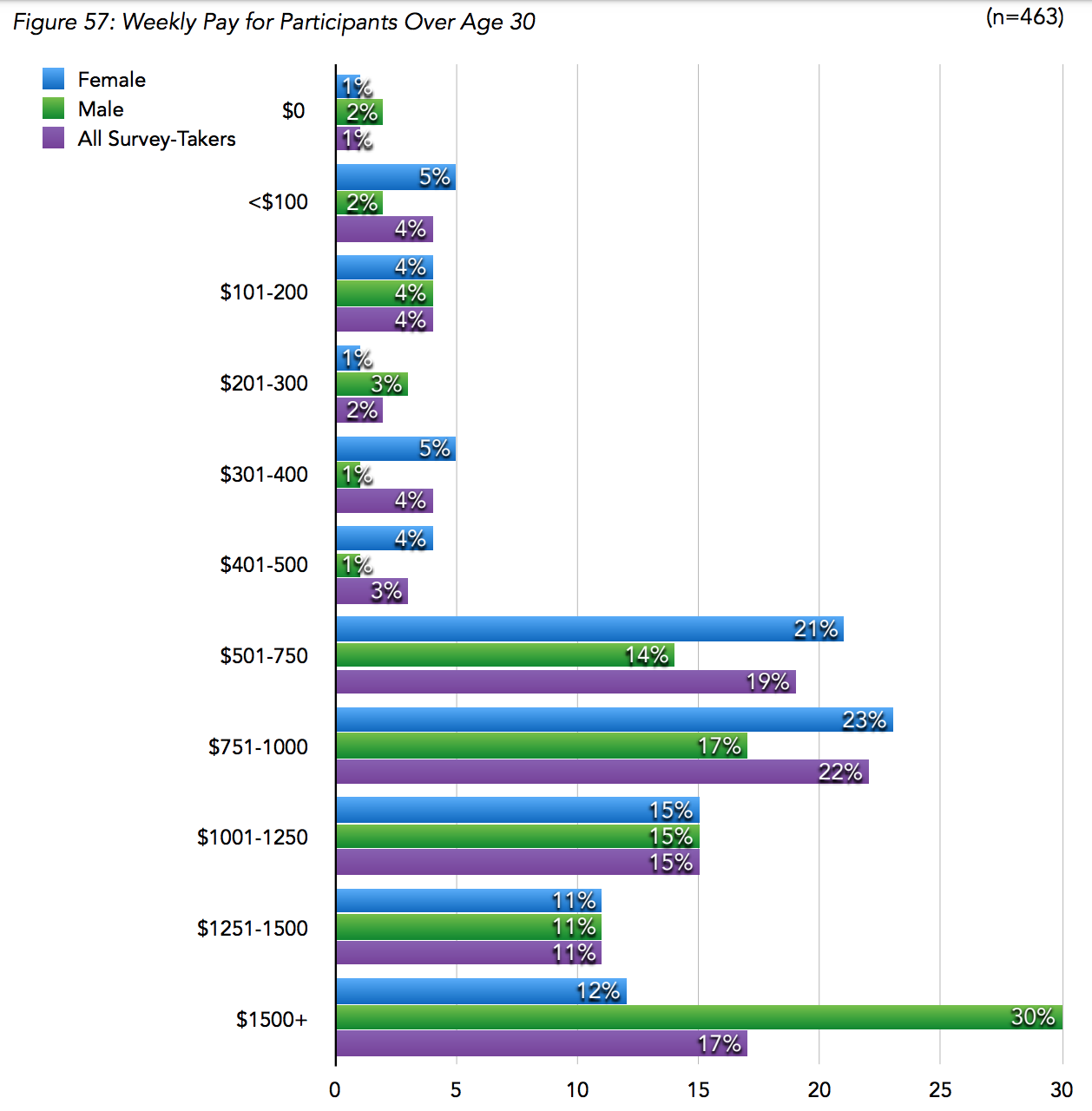
Ah, but surely Mel, there are just many more men working as stage managers and this proportion can’t be that out of whack right?
Nope. Not until you get into your 70s.
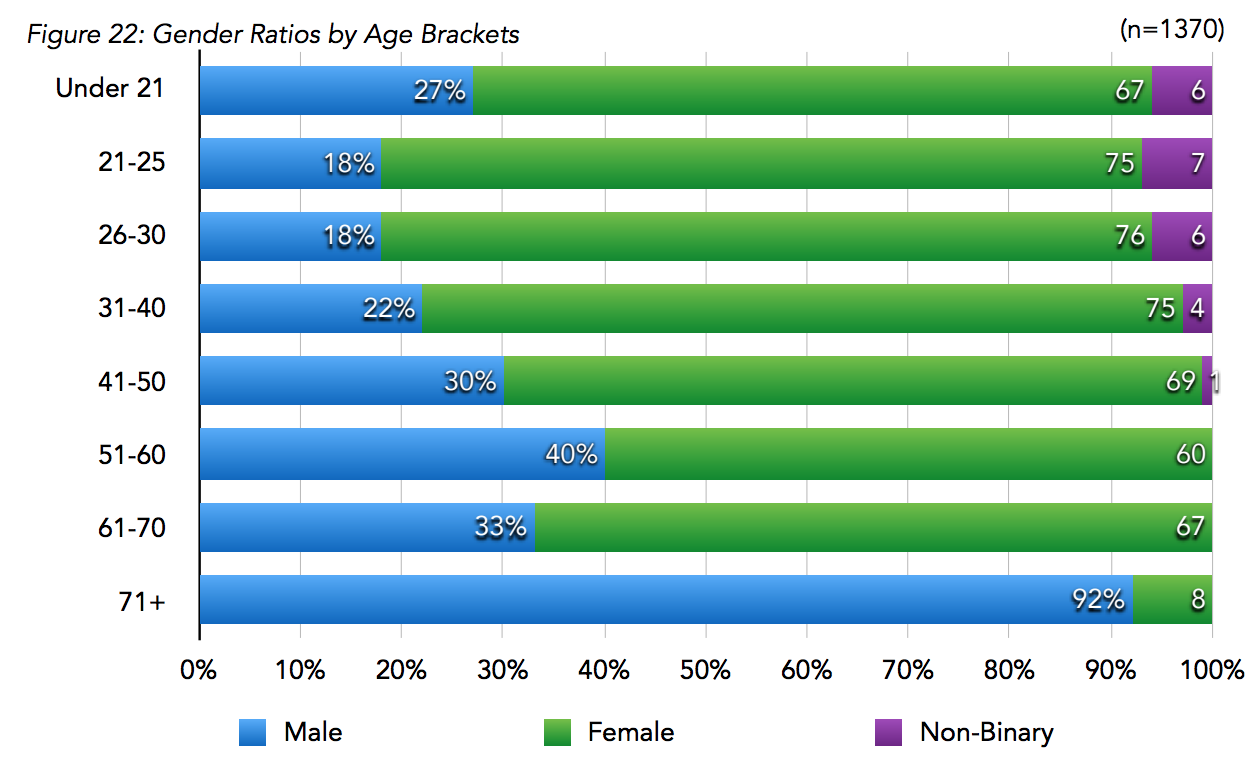
I mean, we knew that already, right? This is one of the few career paths where we assume being a woman is not discriminated against because there are just so many of us in this field. True. Very true.
But not at the top of the field.
So I have a lot of questions that don’t really have answers yet. Other than W.T.F. So ladies and non-binary folx, we do need to learn how to negotiate better.
Sigh.
Anyway.
Let’s dive into internships a little.
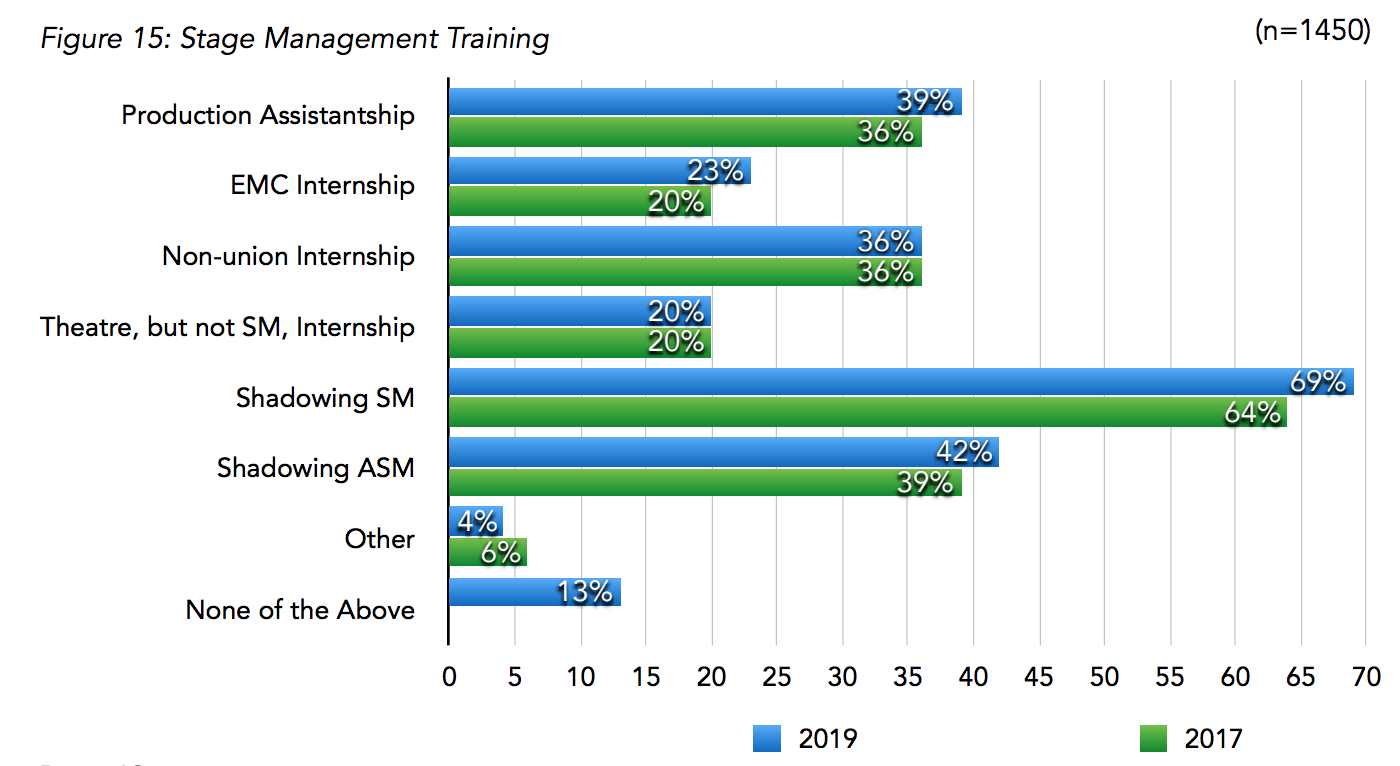
For my stage managers just starting out, a sizable chunk are still doing internships and/or starting as Production Assistants.
I do also enjoy that shadowing is on the rise. I think it’s incredibly useful, and not only for new SMs. Not only does it give students a chance to see everything in action, at full speed, they get to see the thousands of different little nuances each stage manager has. Additionally, it’s an excellent low key networking move.
Of the 207 folks who reported on recently doing an internship/apprenticeship, they show us that pay scale is still non-existent/BS for these positions. We can talk about diversity and inclusion until we’re blue in the face, but until there’s a way for everyone to be able to afford these educational opportunities, I don’t really think it’ll happen.
That being said, if you’re a high school student or college freshman or sophomore and footing the bill to live in a big city for a summer or semester is something you view as financially impossible right now – making it a goal for an upperclassman summer or post college and starting to save for it now can provide you with a valuable learning experience.
And maybe you’ll be one of the few and fortunate to fall into the orange/red slices there – but $2000 a month pretax in NYC is really not a lot of money.
Here is one more key metric, whether or not the students who did internships thought they were useful.

So make sure you do thorough research when applying. Not all internships are created equal.
Moving on from internships, how about contract negotiations?
(And if you want to learn how to negotiate better, there was recently an excellent masterclass on it at TheatreArtLife for about $15 that should be up on their Education page soon.)
Because, let’s face it, I know I suck at contract negotiations.

I think the key thing to take from this graph is that last column that says “Never Succeeded.” Look how low it is.
Even once you take gender into account, it’s still worth giving it a shot (though we do get shot down entirely 7% more of the time. Sigh again. But perhaps we just need to get better at it, let’s give those producers the tiniest benefit of the doubt).
It is also nice that there is a slight rise in folks trying to negotiate.

Ok, one more bar graph of anger – the average pay increase when you do successfully negotiate for the majority of ladies (45%) is up to 5%. For the majority of gentlemen (38%), it’s 6-10%. So many questions – are they just asking for more and we’re asking for less.
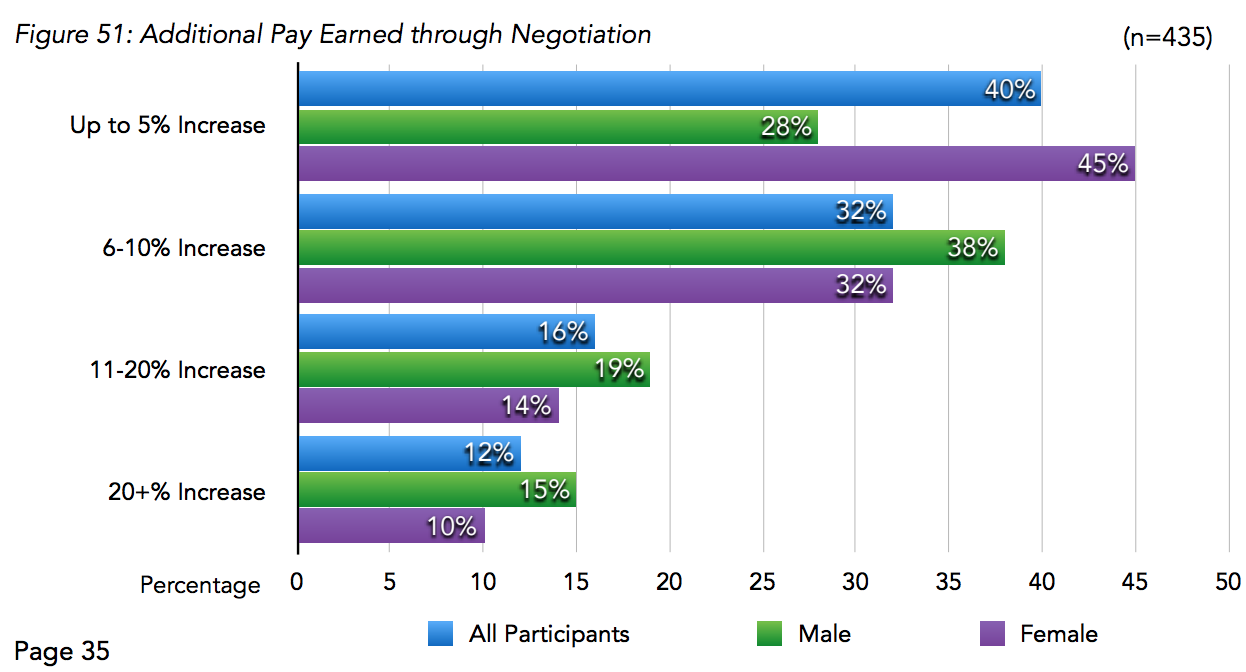
I can say, I have hired for a few positions in the past and I always set the starting salary lower than what the company capped me at, in case I found a great candidate and needed to offer them bump from what I had posted.
No one, male or female, ever asked me for that bump. I was shocked. I would’ve given any qualified applicant at least a small bump if they had tried to negotiate it.
(Don’t use this against me if I’m ever trying to hire you – the company I was working for at the time gave me a lot of latitude I may not have at future companies. Though I also wouldn’t hold it against you if you asked if there was any room for negotiation in an initial offer.)
Another useful graph is this one, because not all compensation has to be money (though we do and should love money). Sometimes you work for a tiny little company with no more money to give – there are still some decent perks you can ask for.
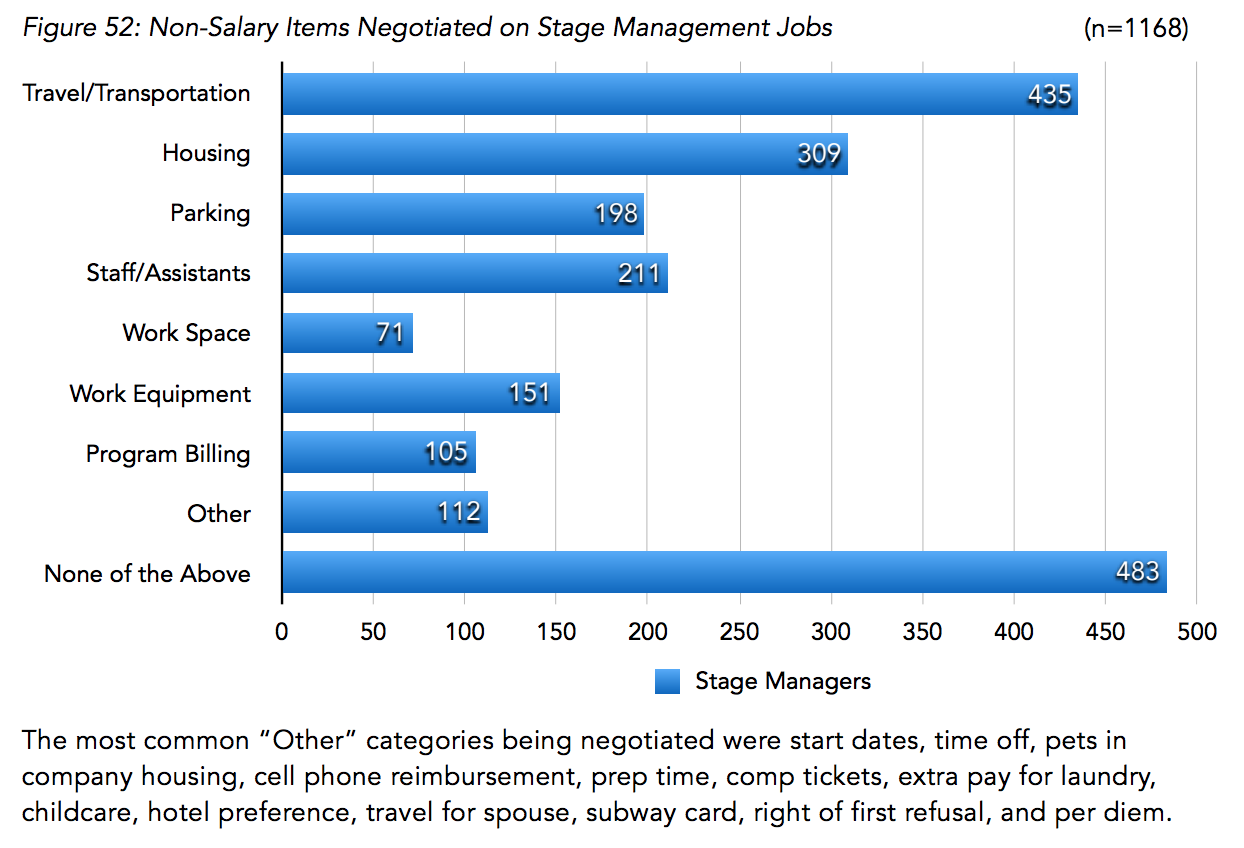
I can’t rave enough about how jobs that cover housing are small miracles that let you powerhouse pay off debts and save for the future. Housing is really a big perk.
Speaking of all this work, where are stage managers looking for it?
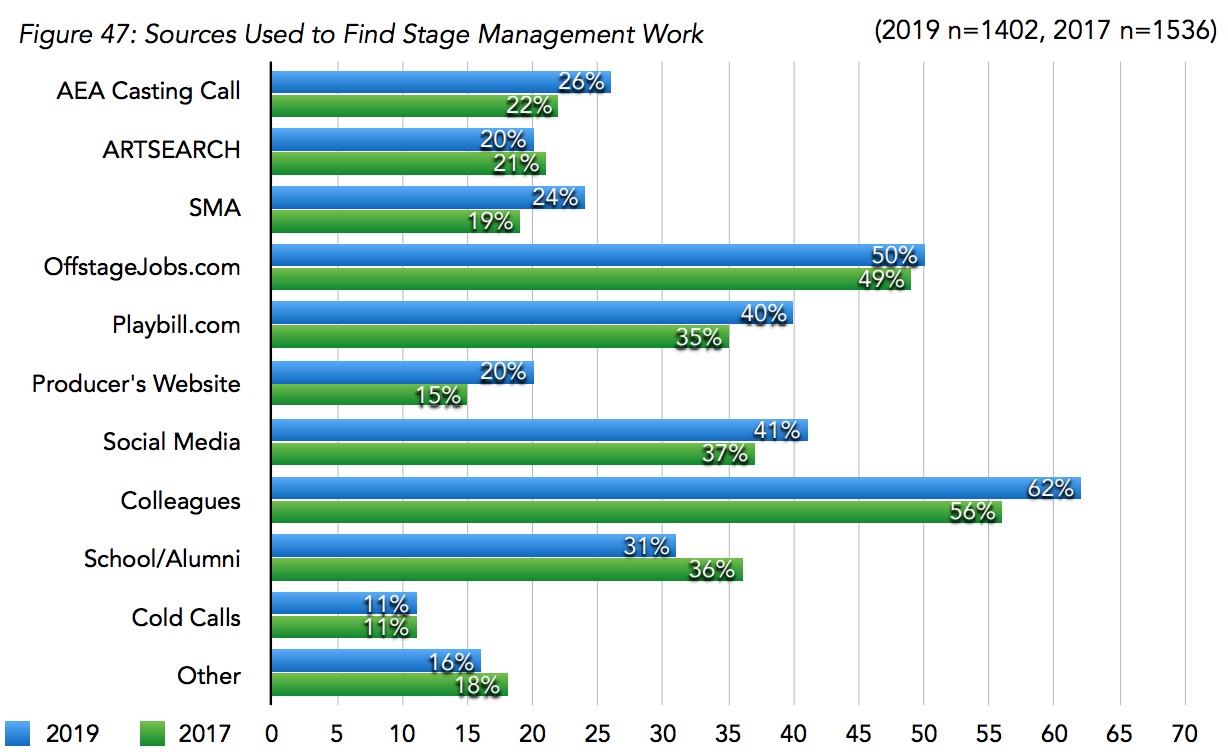
If you’re still trying to figure out where you can look for stage management jobs, check out this comprehensive list I try to keep pretty up to date right here.
As far as social media, the majority aren’t getting job offers there, but the ones who are, are getting them on Facebook.
I don’t find this super surprisingly considering what feels like a Facebook revolution in stage manager groups in the last few years. For many moons, my Facebook was a place to keep up with old pals, but these days, it just seems like a compendium of stage management and circus related groups with the occasional friend’s baby picture popping up between those work related posts on my feed.
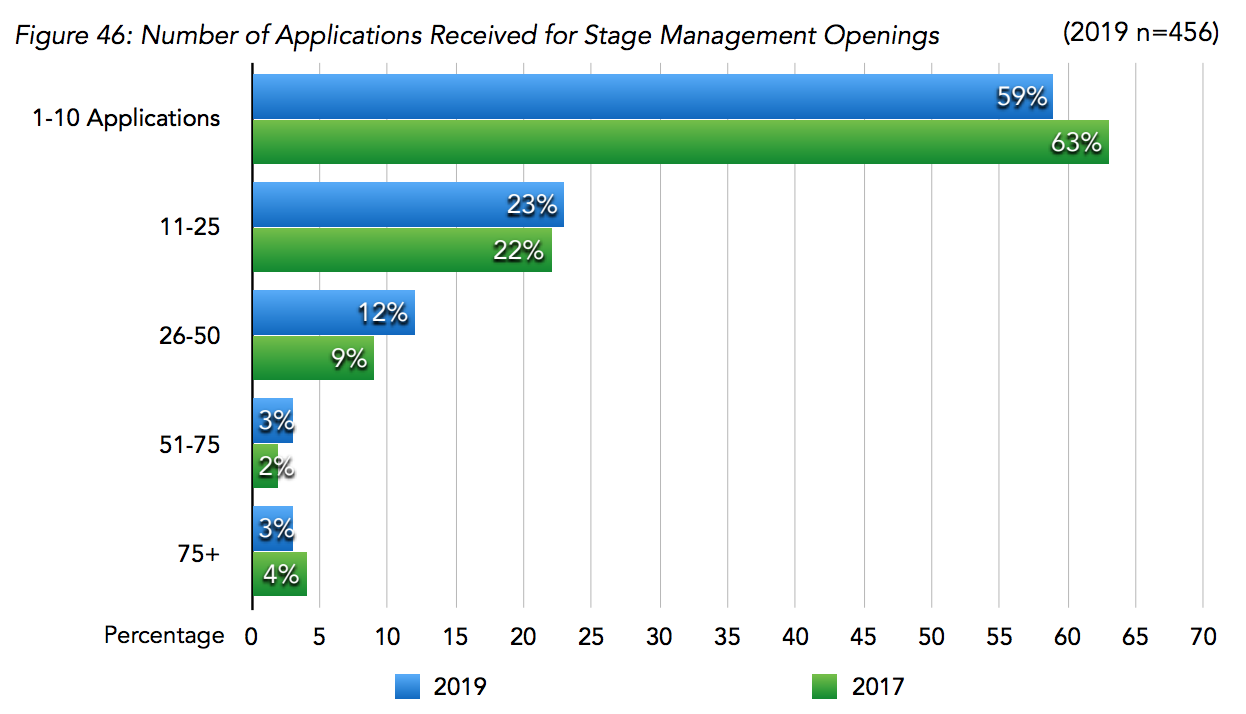
One chart I find particularly interesting is this bar graph of average number of resumés received. The competition is perhaps not as fierce as we think. I know when I was hiring my replacement at Big Apple a few years ago, I got about 10 resumés.
Ten. Resumés.
For a job with a high salary, benefits, and housing.
I was very puzzled.
So, send in those resumés. Shoot for the stars.
Finally, let’s look at what technology everyone is using.
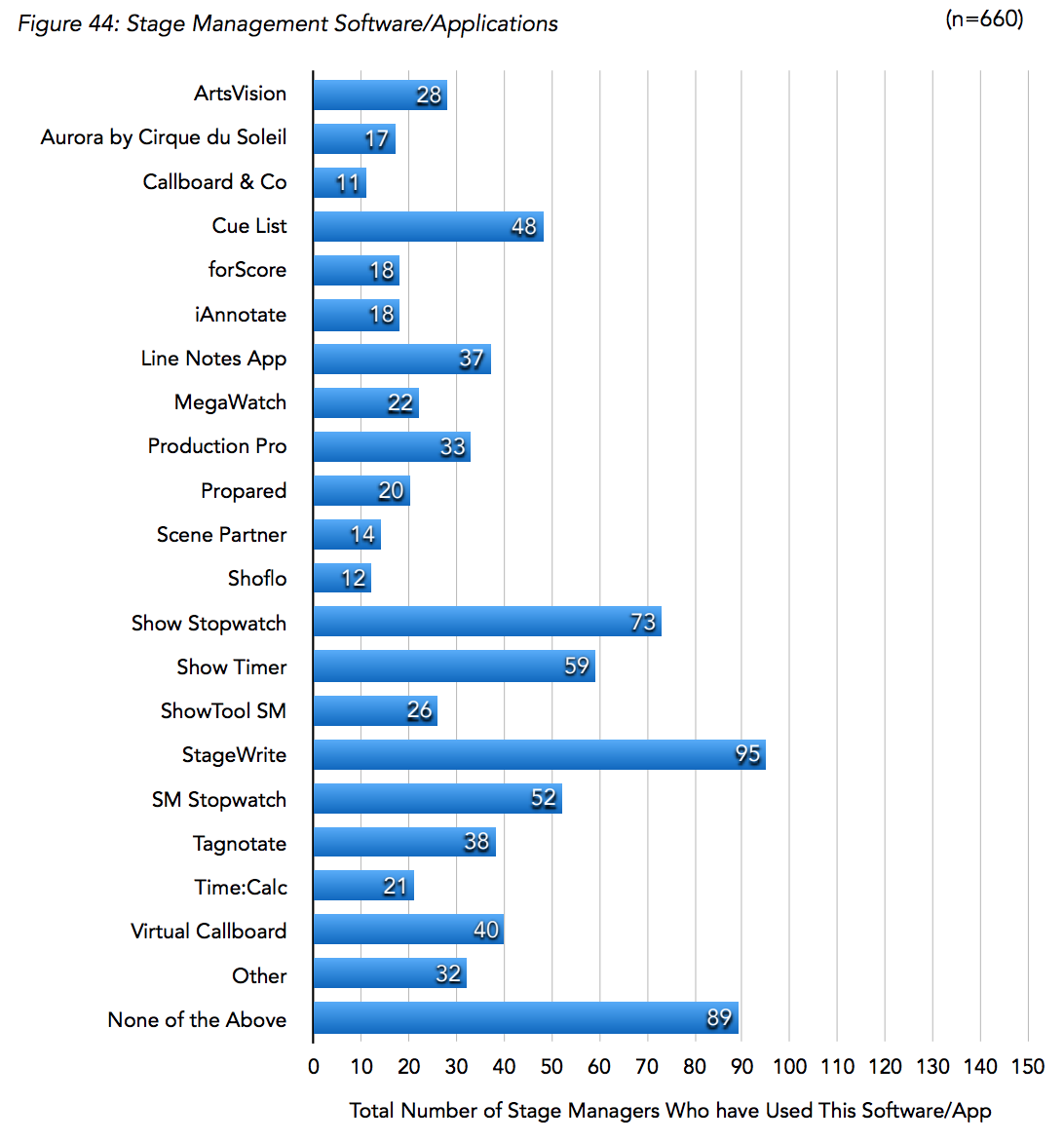
Why does this matter?
Well, with a quick glance here, I’d say if you’re looking for a quarantine project, the software to learn is StageWrite (which, yes, yes it is – StageWrite is delightful for large scale shows and shows with large turnovers where you are constantly sending out blocking charts to new people to learn their positions).
If you are an SMA member, there’s actually a lecture on StageWrite here, if you’re logged in. If you’re not an SMA member, well, why not?
If you’re not an SMA member, the Broadway Stage Management Symposium has a variety of software they are doing webinars on during social distancing that you can find here.
Now is a good time to check out some demos and try to learn a little more about how some of this software works.
Mr. McGraw, if you’re listening out there, similarly I’d also love to know what certifications stage managers find useful in their work.
And we’ll finish up with my favorite graph every year. The one that makes me laugh so hard, because as a primarily touring stage manager, I can agree, our lifestyles are not the healthiest – always love to see it quantified though.
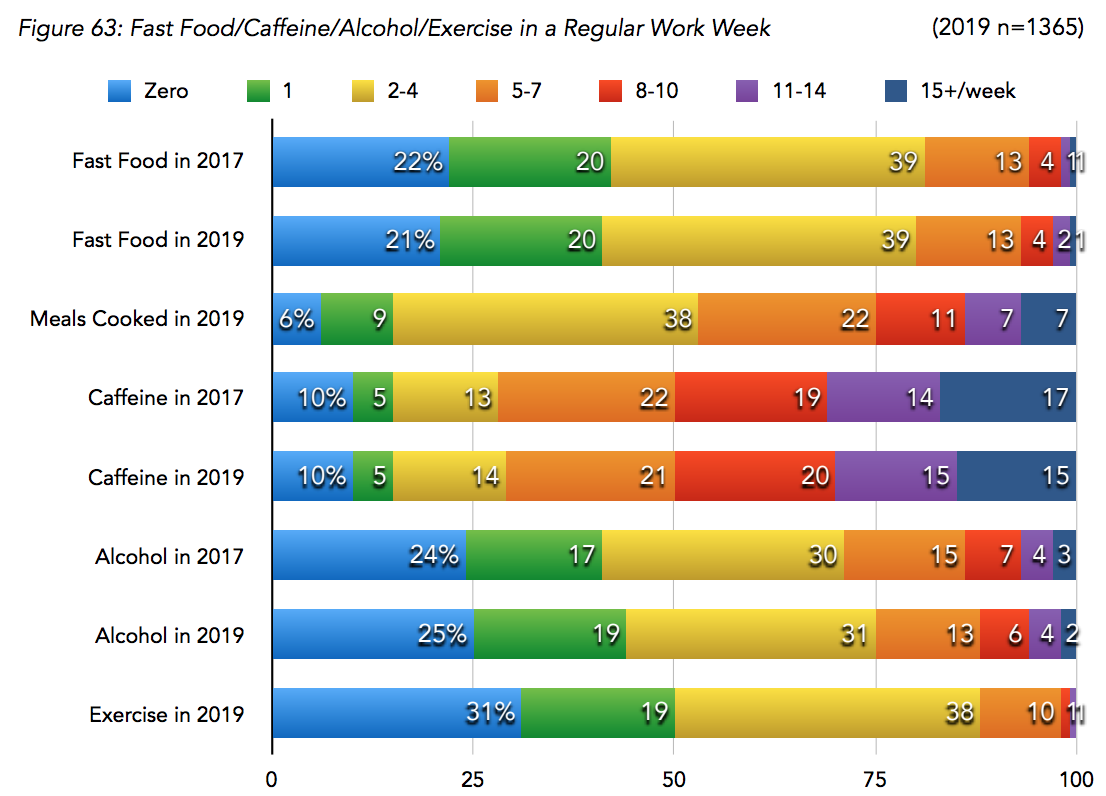

Social Distancing Check In: How is the Isolation?
Financial Stability in the Arts amidst the Coronavirus


Melissa Bondar is a touring stage manager and personal finance enthusiast who blogs at brokeGIRLrich. She has been stage managing since 2004 and some of her favorite jobs include working with Ringling Brothers and Barnum & Bailey Circus, Sleep No More, and Big Apple Circus. She also did a lengthy stint with Holland America Line onboard their ships at the beginning of her career. Along the way, she realized she was pretty concerned about whether or not she’d ever be able to retire and started learning more about personal finance. The more she learned, the more she realized we really needed to improve our financial literacy in the arts, so she’s been blogging about it ever since.
Read Full Profile© 2021 TheatreArtLife. All rights reserved.

Thank you so much for reading, but you have now reached your free article limit for this month.
Our contributors are currently writing more articles for you to enjoy.
To keep reading, all you have to do is become a subscriber and then you can read unlimited articles anytime.
Your investment will help us continue to ignite connections across the globe in live entertainment and build this community for industry professionals.